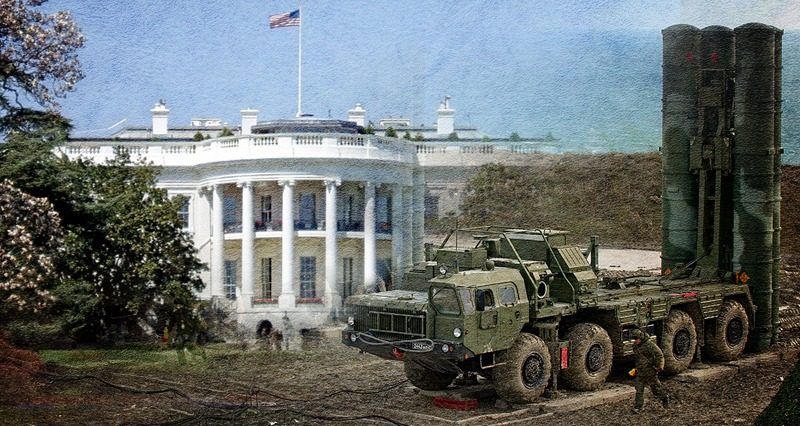After Ankara began to receive the S-400 missile systems they had purchased from Russia, Trump gathered republican senators for a meeting in the White House to discuss possible retaliatory actions against Turkey.
Members of Congress have been unhappy with Turkey’s decision to buy the long-range missile defense systems, but have not yet decided what measures to take in response. Congress’s cautious position indicates that imposing sanctions could end up becoming a very complex ordeal.
POWER IN UNITY
Ankara’s purchase of the Russian defense systems has become one of the most pressing and complex issues in Turkish-American relations. Turkey has refused to be swayed by blackmail and threats from the US and NATO, who deeply oppose the purchase. Turkish authorities, however, did find support domestically, even from opposition parties and the general population. As a result of the country’s unity on the matter, Turkey was able to move forward with the purchase in spite of their allies’ warnings.
Turkey went as far as to warn NATO officials that it is “not bound for all time” to the Alliance and, if necessary, could leave altogether.
US ATTEMPTS TO SAVE FACE
The US desperately tried to stop the purchase and delivery of the S-400s– in the end, however, they not only failed to stop the sale, they also seriously damaged their own reputation in the eyes of the international community. Now, the American establishment is trying to come up with a plan to rectify the situation they themselves created by demanding until the last moment that Turkey refuse the Russian complexes.
The US has changed dramatically since Trump became president. On many issues, President Trump holds one point of view, while Congress, the Pentagon and his opponents take another.
MUCH ADO ABOUT NOTHING
The meeting which took place at the White House regarding the S-400s was held in secret, despite that the world community, Turkey in particular, is waiting to learn if a decision has been made regarding sanctions. However, looking at the results of the meeting, it is safe to say it was little more than a storm in a teacup — which is perhaps to be expected given how little coherence and unity there is in the Trump administration. The United States has begun to realize that Turkey is a “tough nut,” which won’t be easy to crack.
EMPTY THREATS?
According to media coverage citing inside sources, many US government officials are furious with Turkey’s decision to buy the S-400s, but have yet to come to an agreement on how the government should respond in the long term. According to Reuters, Congress has adopted a “cautious” position indicating that the possibility of sanctions may have fallen into the background.
PRESIDENT TRUMP SPEAKS OUT AGAINST SANCTIONS
During a press conference at the White House on July 23, Donald Trump suggested that Republican senators reject imposing sanctions on Turkey over the sale. However, many Republicans, and even some Democrats, came together and wrote a letter urging the government to impose economic penalties.
The Washington Post covered the details of Trump’s meeting, where he and 45 Republican senators discussed how to react to Turkey’s decision to buy the complexes. While several possible measures were discussed, sanctions seemed to be the most likely option, advocates arguing they could be justified under the ““Countering America’s Adversaries Through Sanctions Act” (CAATSA).
Despite the hype over the issue, the government has yet to issue an official statement, even after Trump’s meeting had come to a close. However, some of the politicians who participated spoke to the media afterward. According to the information they provided, influential party members are insisting on imposing sanctions and have already had open discussions with the president.
HEATED DEBATES
The Post’s sources also said that there had been fierce discussions between those in favor of sanctions and those who have followed the president’s path of skepticism.
Some expressed their fundamental opposition to the idea of a NATO member country buying Russian defense complexes, and argued that sanctions are an essential lever of pressure.
At one point, things apparently got heated between Trump and Republican Senator James Risch, the chairman of the Senate Foreign Relations Committee. The senator warned Trump that waiving the penal measures against Turkey could jeopardize the security of NATO, as well as the alliance’s F-35 aircrafts which are designed to avoid radar detection for systems like the S-400.
“HOW WE NEED TO TALK WITH ERDOGAN”
During the meeting, Trump attempted to shift the focus from the topic of sanctions against Turkey to issues related to the healthcare system, migrants and new financial regulations… but, according to the article, the other politicians were strict about keeping him on task.
Senator John Hoeven said that the main debates were over how best to negotiate with Turkish President Recep Tayyip Erdogan.
Senator David Perdue, known for his proximity to Trump, supported the president’s push for opening negotiations with the Turkish side. Trump is attempting to take a much wider approach to the issue: if we consider the problem solely in light of Turkey’s actions, sanctions seem to be a reasonable response. However, if the US takes into account the broader issues affecting the region, and remain attentive to changes taking place in several large states there, things begin to get far more complicated. This is particularly true in light of Turkey’s recent attempts to find new allies on the geopolitical stage.
Instead of simply sanctions, some felt that new trade agreements with Turkey could be offered as mutually-beneficial incentives to play by Washington’s rules.
SOME DEMOCRATS WELCOME THE IDEA OF SANCTIONS
It is not only Republican senators who are in favor of imposing sanctions on Turkey. Several Democrats, who were not invited to the meeting, wrote a letter to Trump saying they share the views of the head of the State Department, Mike Pompeo on the need for sanctions in accordance with the law.
The letter, written on the initiative of Democratic Senator Robert Menendez of the Senate Foreign Relations Committee, emphasized that if the United States does not take decisive steps, Turkey’s effectiveness in the alliance will be compromised, as will the sanctions regime against Russia.
PRESSURING TRUMP TO PLACE SANCTIONS
Texas senator John Cornyn noted in his interview with Bloomberg that Trump looked nervous and irritated throughout the event, as the actual delivery of the S-400s had left him with little room to maneuver.
Texas Senator Ted Cruz noted that most of the politicians who participated in the meeting were very well aware of the importance of maintaining relations with Turkey. Yet, at the same time, Turkey’s purchase of both the S-400s and NATO’s F-35 fighter jets created an extremely controversial situation. Many senators were dead-set on forcing Trump’s hand to block the deliveries.
While answering journalists’ questions last week, Trump said he was not considering sanctions for the time being. Meanwhile, many congressmen believe that Trump needs to take action using CAATSА legislation.
At the same time, both Democrats and Republicans emphasized that Turkey had become the first NATO member country to buy major defense systems from Russia.
IMPOSING SANCTIONS VIA CAATSA
Politicians are divided about using the CAATSA as a basis to impose sanctions.
According to journalist Begum Dönmez Ersoz of Voice of America, Trump is required to select at least 5 of the 12 sanction articles provided for in the 70-page text of the law.
These articles are:
– termination of banking support for export-import operations to persons and organizations subject to the sanctions,
– Refusal to issue a license for the export of goods and technologies,
– Refusal to provide loans by US financial institutions
– Refusal of lending by international financial organizations
– Refusal to issue permits to financial organizations to conduct direct trade with the US Central Bank,
– Refusal to hold tenders or enter into agreements with persons or organizations subject to sanctions,
– The prohibition of currency transactions,
– Prohibition on making payments or credit transfers between financial institutions and banks,
– The ban on the ownership of real estate in the United States for persons or organizations subject to the sanctions,
– The prohibition on trading in capital or taking a loan from persons or organizations subject to sanctions,
– The ban on entry into the United States for persons subject to sanctions,
– The imposition of sanctions on senior representatives of companies or persons similar in their activities to persons or organizations subject to the sanctions.
The President of the United States can, according to the law, grant an exemption for a maximum of 180 days (6 months), which can then be extended for another 180 days.
The CAATSA Act includes a mandatory congressional review of the president’s decision to grant the exemption.









Leave a Reply